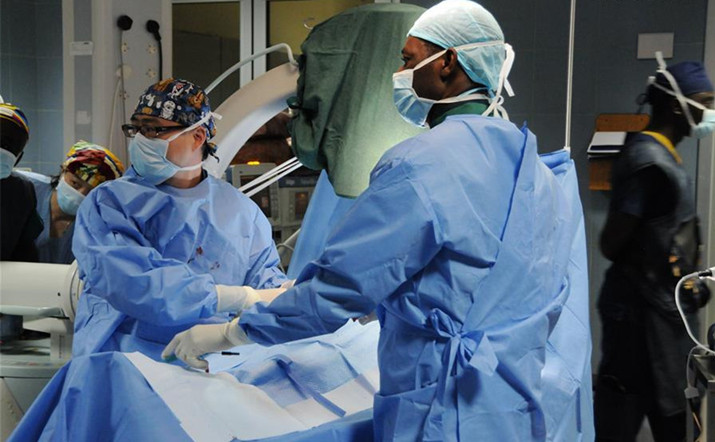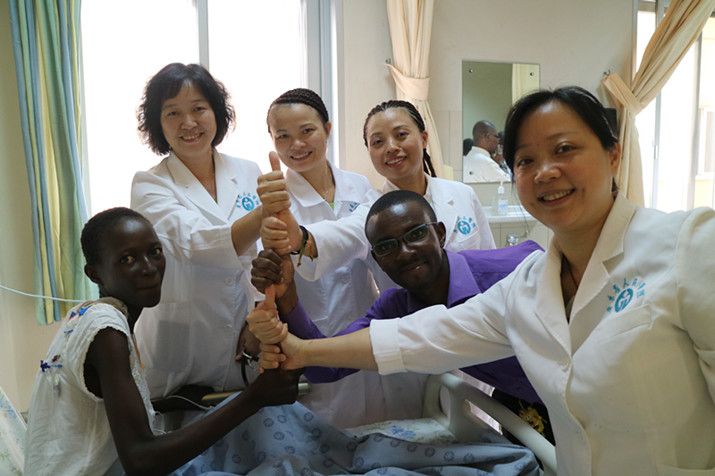|
||||||||||
| Home Nation World Business Opinion Lifestyle ChinAfrica Multimedia Columnists Documents Special Reports |
|
||||||||||
| Home Nation World Business Opinion Lifestyle ChinAfrica Multimedia Columnists Documents Special Reports |
| China |
| Structural Healing |
| China supports capacity building to help Africa develop sustainable health systems |
| By Liu Jian | VOL. 8 November 2016 ·2016-10-27 |

Adu-Boakye, who practices medicine at the Komfo Anokye Teaching Hospital (KATH) in Kumasi, Ghana, was based at the Guangdong General Hospital’s Cardiovascular Institute since November 2015, being trained as a specialist in pacemakers.
In July Adu-Boakye returned briefly to Ghana, along with other Ghanaian doctors, to work with a 12-member team of Chinese cardiac experts from the Institute to perform open heart surgeries on four patients and implant pacemakers on five others at KATH.
"After months of training, I returned temporarily to put my skills acquisition to work here [in Ghana]," said Adu-Boakye, who hopes to set up a local pacemaker program with other Ghanaian cardiac specialists.
Meeting African needs
Among non-communicable diseases, cardiovascular disease is one of the biggest threats to Ghana’s population, which has a 37 percent prevalence rate of hypertension, according to Lin Chunying, head of the Chinese cardiac experts’ team in Ghana.
“What Ghana needs most is technical know-how and cardiovascular specialists who can use technology to treat heart diseases," said Lin. "The aim of this medical assistance project is to train Ghanaian doctors how to conduct heart surgeries themselves," she said.
This would mean patients don’t need to drive more than 200 km to Ghana’s capital Accra to implant pacemakers. They could do it in Kumasi, Lin said.
In addition, Ghana has not conducted risk factor surveys to establish the national baseline prevalence rates and accurately quantify the magnitude of non-communicable diseases.
To address this issue, a cardiovascular risk research center will be set up at KATH, in collaboration with the Guangdong Cardiovascular Institute.
"The center will help to identify the actual causes, risk factors and come out with appreciative strategies to address some of the causes," said Doctor Isaac Kofi Owusu, head of the Cardiac Unit at KATH.
For a start, since September, the institute has worked with KATH’s Cardiothoracic Center to conduct a six-week research project titled "Prevalence of cardiovascular disease risk factors in the Ghanaian communities" in four of the country’s regions.
"It will help to identify risk factors of heart or blood vessel diseases in communities and provide timely support and treatment systems," said Owusu.
As one of the demonstration projects supported by China’s National Health and Family Planning Commission (NHFPC), this project aims to enhance the capacity of the Ghanaian surgeons to respond to cardiac cases and help address the public health challenges across the country.
"In order to pool our strengths and specialties and promote cooperation, 20 Chinese and African hospitals from each side will be linked through the sister hospital initiative," said Feng Yong, Deputy Director General of NHFPC’s Department of International Cooperation at the Innovation of International Medical Aid Seminar, part of the 2016 Beijing Forum for Global Health held in August.
Sustainable health systems
China’s assistance to Africa started in 1963 and to date more than 20,000 medical workers have been sent to work for some time in more than 40 countries in Africa. During the 2016-18 period China will send 1,500 medical workers to Africa, according to the NHFPC.
The need for these personnel and Africa’s lack of health facilities were clearly shown up during the Ebola outbreak in West Africa in 2014, which left thousands dead. "The Ebola crisis was a tragic awakening for people around the world about the crucial importance of strong health systems," said Cheng Feng, Professor at the Research Center for Public Health of Tsinghua University (TPHRC).
China was among the first to deliver emergency support to the Ebola-hit countries, with more than 1,200 health professionals including lab technicians and public health specialists sent to the affected areas.
Public health is among the 10 major China-Africa cooperation plans for 2016-18. In the post-Ebola era, China is also providing assistance and support in the establishment of disease control and prevention systems at regional and national levels to reinforce laboratory and diagnostic capabilities in the coming three years.
These include a research center of tropical diseases in Sierra Leone, a center for disease control (CDC) in the African Union Headquarters in Ethiopia and five regional CDCs in Kenya, Zambia, Nigeria, Egypt and Gabon.
"This will reinforce the surveillance, monitoring and response capacity of African countries to public health emergencies," said Li Bin, Minister of China’s NHFPC. "It is of great importance to set up a well-working public health system in Africa, particularly in response to emerging infectious diseases," she said.
Knowledge transfer
To support capacity building of public health in Africa, China continues to train doctors, nurses, public health workers and administrative personnel for African countries.

Since 2014, the TPHRC’s one-year International Master of Public Health Program, supported by Chinese Government scholarships, has seen more than 30 African students, who are public health officials, disease prevention and control specialists and health program managers, graduate from this program, according to Cheng Feng.
“The program aims at building a new generation of global public health leaders in the developing world, said Cheng, adding that courses such as epidemiology, healthcare management, global health governance, and health communication are offered.
Access to medicine
China also plans to help Africa improve the availability of health and diagnostic services and commodities, as well as improve Africa’s capacity for independent and sustainable development in the field of medical care and health, according to the Forum on China-Africa Cooperation Johannesburg Action Plan announced last December.
Thanks to its advances in research and development and the capability of producing high-quality and low-cost medicines and vaccines, China can play a unique role in supporting African health development and make a positive impact in the developing world.
A good example is Humanwell Pharmaceutical Africa, part of Humanwell Healthcare Group, a Chinese leading healthcare solutions provider, which built the first modern medicine production plant in Mali in 2009 in collaboration with the China-Africa Development Fund.
With the focus on developing products that address the large unmet healthcare needs in Mali and other Western African countries, it has provided low-cost medicines for the West African markets as well as created job opportunities locally.
The company has recruited more than 100 local staff and has also been working to share its knowledge and expertise with the local workforce, during which skills are transferred to benefit Mali’s economy in the future.
"This plant ends our history of no medicine production, and helps equip us with the medicine production capacity, so that we can produce medicines independently in the future," said Mali’s President Ibrahim Boubacar Keita.
China pledged to encourage 10 large Chinese pharmaceutical and medical equipment enterprises to cooperate with African counterparts at the Second Ministerial Forum of China-Africa Health Development held in Cape Town, South Africa last October.
"China’s funding, skills, knowledge and products are not only critical to improve health conditions in African countries, but are also adaptable in evolving contexts and changing needs," said Ted Chaiban, United Nations Children’s Emergency Fund’s Director of Programs.
| About Us | Contact Us | Advertise with Us | Subscribe |
| Copyright Beijing Review All rights reserved 京ICP备08005356号-5 京公网安备110102005860号 |